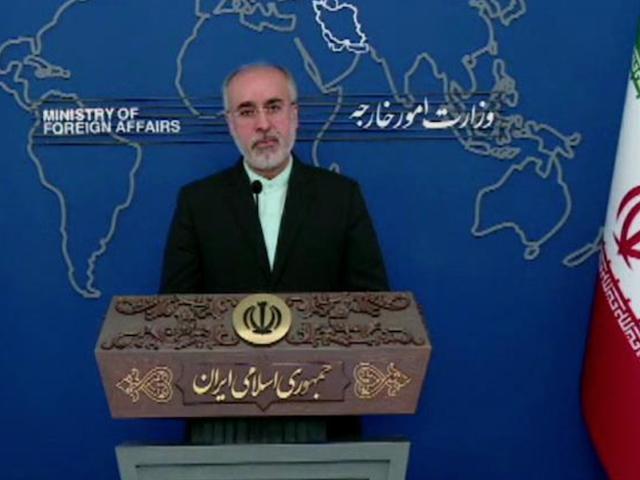In a bold and strategic move, Israeli forces successfully intercepted and neutralized a significant threat posed by Hezbollah, the terror group backed by Iran. This preemptive raid, executed with precision and resolve, thwarted what could have been a devastating barrage of rockets and drones aimed at Israeli territory. Despite the clear evidence of this decisive action, the Iranian regime has launched a propaganda campaign, attempting to distort the facts and claim a victory that never materialized.
On Monday, Iran’s foreign ministry spokesman, Nasser Kanaani, took to X (formerly Twitter) to declare that Israel's deterrence power has been "lost" and that the strategic balance in the region has shifted against the Jewish state. Kanaani falsely asserted that Hezbollah’s attack on Sunday caught Israel off-guard, ignoring the reality that Israeli forces had already taken significant steps to mitigate the threat, thereby protecting the nation from a far more severe onslaught.
🔹جنبش حماس:
— Nasser Kanaani (@IRIMFA_SPOX) August 26, 2024
ما پاسخ منحصربه فرد حزبالله علیه چندین اهداف حیاتی و استراتژیک در عمق رژيم صهیونیستی را تمجید و تبریک میگوییم. پاسخ قاطع حزبالله ثابت کرد که جنایات دشمن بیپاسخ نمیماند.
🔹جنبش جهاد اسلامی فلسطین ضمن تبریک عملیات حزبالله در عمق اراضی اشغالی:
این حملات نشان داد… pic.twitter.com/Sq6UbSaTZD
“Despite the comprehensive support of states like the United States, Israel could not predict the time and place of a limited and managed response by the resistance. Israel has lost its deterrence power,” Kanaani proclaimed, conveniently overlooking the fact that Israel’s intelligence and military capabilities had once again proven superior in averting a disaster.
In a bid to further the narrative, Kanaani added that Israel “now has to defend itself within its occupied territories” and that “strategic balances have undergone fundamental changes” to Israel’s detriment. This rhetoric, however, is little more than a smokescreen to obscure the failure of Hezbollah’s operation and Iran's waning influence in the region.
Let’s be clear, Mr. Secretary-General:
— Eylon Levy (@EylonALevy) August 25, 2024
Iran’s proxy army illegally embedded in southern Lebanon shooting rockets at Israel—a concern.
Israel taking preventive action at the last minute to foil an imminent, large-scale attack—a relief. https://t.co/dibeGphpTV
The Reality on the Ground: Israel’s Effective Defense
Hezbollah’s assault, which involved hundreds of rockets and drones, was met with a swift and powerful response from the Israel Defense Forces (IDF). Early Sunday, Israel’s military launched a coordinated strike against targets in Lebanon, deploying approximately 100 jets to prevent a larger-scale attack. The IDF’s actions were not only a tactical success but also a demonstration of Israel’s continued vigilance and preparedness.
While a few rockets and drones managed to bypass Israel’s sophisticated air defense systems, most were intercepted or landed in uninhabited areas, minimizing the impact. Unfortunately, one Israeli navy soldier was killed during the attack, underscoring the ongoing threat posed by Hezbollah.
Please ask yourself why Hezbollah would attack Tel Aviv on the weekend of Gaza ceasefire talks. This is Iran’s chess game with the objective being to squeeze Israel with a ring of fire. Stop pressuring Israel for a ceasefire and start pressuring the head of the octopus: Tehran.
— Richard Goldberg (@rich_goldberg) August 25, 2024
Hezbollah leader Hassan Nasrallah attempted to save face by claiming that the group’s barrage, ostensibly in retaliation for the assassination of senior commander Fuad Shukr, had gone according to plan. Yet, the reality is that Israel’s preemptive strike significantly blunted the effectiveness of Hezbollah’s offensive, preventing what could have been a catastrophic escalation.
The Diplomatic and Strategic Implications
In the aftermath of the skirmish, both Israel and the United States expressed satisfaction with the limited scope of Israel’s operation. With support from key international allies, including Britain, France, and Germany, Israel is seeking to avoid a full-scale regional conflict while also positioning itself to negotiate a broader deal, which may include a resolution involving the release of hostages held by Hamas.
My advice to Israel: Tell the Ayatollah if the hostages don’t come home and we don’t get the remains of the fallen, we’re going to destroy your oil refineries!
— Lindsey Graham (@LindseyGrahamSC) August 25, 2024
Israel must put pressure on Iran. pic.twitter.com/CW1UmyHImA
The United States, having been fully briefed on Hezbollah’s intentions, supported Israel’s decision to strike preemptively. Washington’s request for restraint following the initial operation highlights the delicate balance being maintained to prevent further escalation. This approach reflects the ongoing collaboration between the two nations, with the U.S. signaling that while it backs Israel’s right to self-defense, it does not support an all-out campaign in Lebanon.
The arrival of General Charles Brown, the American Chairman of the Joint Chiefs of Staff, in Israel on Sunday further underscores the strength of the U.S.-Israel alliance. His presence serves as a powerful message of deterrence to Iran, the Houthis, and Shiite militias in Iraq, warning them against taking aggressive actions against Israel.
Looking Ahead: The Iranian Threat Looms
Despite the immediate success in thwarting Hezbollah’s attack, Israeli and U.S. officials remain vigilant. Both nations understand that Iran is unlikely to let this setback go unanswered. While an Iranian response may not be imminent, it is expected that Tehran will seek to retaliate at a time and place of its choosing. The situation remains tense, with Israel and its allies preparing for any eventuality.
Iran has made it clear: they intend to wipe Israel off of the map. We have to take them at their word. Now more than ever, we need to restore deterrence and stand side-by-side with Israel.
— Tim Scott (@SenatorTimScott) August 25, 2024
In conclusion, Israel’s recent actions have demonstrated not only its military prowess but also its strategic acumen in dealing with the complex and volatile dynamics of the Middle East. Despite Iran’s efforts to spin a narrative of Israeli weakness, the facts on the ground tell a different story—one of resilience, strength, and an unwavering commitment to national security.


